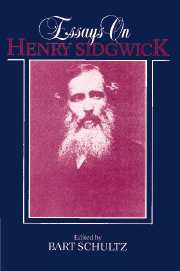Book contents
Introduction: Henry Sidgwick today
Published online by Cambridge University Press: 05 June 2012
Summary
Biography and reputation
Henry Sidgwick, who was born on May 31, 1838, and died on August 28, 1900, lived his entire life within the reign of Queen Victoria and his entire adult life within the confines of Cambridge University, ultimately achieving, in 1883, the status of Knightbridge Professor of Moral Philosophy. Although he began his academic career as a classicist, by 1865 he was examining in philosophy and by 1867 teaching it; in the seventies he added political philosophy and political economy, and in the eighties law and legislation.
His career at Cambridge, where he was also educated – in significant measure through his membership in the discussion group the Apostles – suffered only one interruption, and this in 1869, when he resigned his fellowship because he could no longer in good conscience subscribe to the Thirty-nine Articles of the Church of England as required. Such was Sidgwick's stature with his colleagues that his resignation was promptly met with the creation of a special position, one that did not require subscription, and thus his career continued apace, as did his tireless work in university politics and reform. In 1876 he married Eleanor Mildred (“Nora”) Balfour, with whom he collaborated in a number of areas, but especially on psychical research and women's education. Henry was a founder and the first president of the Society for Psychical Research, and with Nora engaged in numerous investigations of mediums, psychics, ghosts, and so forth – his “ghostological studies.”
- Type
- Chapter
- Information
- Essays on Henry Sidgwick , pp. 1 - 62Publisher: Cambridge University PressPrint publication year: 1992
- 3
- Cited by



